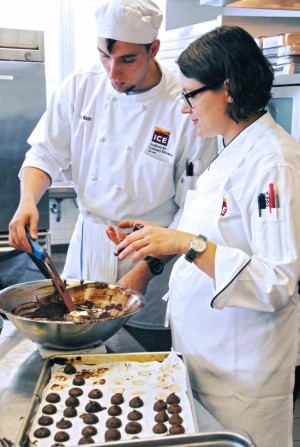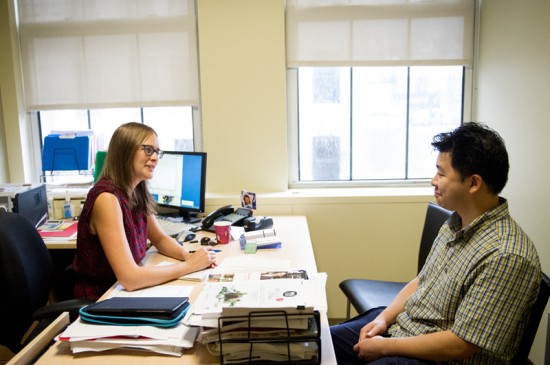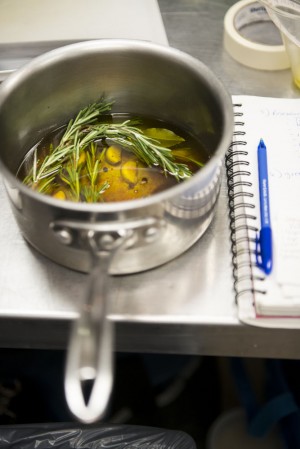Now that you’ve finished writing your cookbook proposal—using my handy little outline published on the ICE Blog last month—the next step is to share your idea with the world! But how does that happen exactly? There are several options for pitching your idea and selling your cookbook proposal, some of which can be more challenging than others.

I’m sharing my top three options for aspiring authors, in order of practical preference: But as I warned you in my previous post: writing a cookbook is a labor of love. If you want to cash in and make millions of dollars, you ought to walk away before you’re too heartbroken. The pitching process takes time, lots of effort and a thick skin—you may have to change your proposal (a little or sometimes a lot) or even worse, it may be rejected.
1. Find An Agent
While it may seem difficult to hand over 15% (this percentage is industry standard) of your cookbook advance money, I can’t think of a better investment. Publishers and editors give first priority to proposals delivered by a good literary agent, so if you want to guarantee that your proposal won’t get lost in a stack of papers, this is the way to go.
A good agent can also help tailor your proposal to the likes of certain publishers. They know if your idea is relevant and on-trend. They can help you to edit the language in your proposal to make it shine—and to help it sell for as much as possible. They do all the legwork: sending your proposal to publishing houses, following up with editors, arranging interviews with potential editors and, if need be, harassing publishers until they take note of your proposal.

But it doesn’t stop there; should more than one publishing house have interest in your proposal, your agent will facilitate a book auction. This gives multiple publishers an opportunity to bid to publish your cookbook. Your agent will do all the negotiating for you, and simply let the publishers go to war.
If your book proposal finds itself a home, lucky you! Now your agent will work even harder for that 15% and negotiate the terms in your contract. Their job is to make certain you do not sign your life away, not to mention the rights to every future book you want to write.
My agent even helped me revise the introduction to my cookbook, select the cover photo and was the sounding board for a million and one questions. At times, when my editor and I didn’t agree, my agent fought the battles for me to ensure I did not tarnish our working relationship. All in all, a relationship with a literary agent is a valuable one—well worth the effort and financial investment.
How do you go about finding one of these highly prized agents? My best advice (unless you are a celebrity and already have agents knocking down your door) is to get a referral. If you know other cookbook authors, ask them to connect you with their agents. If you don’t, go to cookbook signing events and try to meet the writers—network with those who are already successful! Through these relationships, you might find an author who is willing to share a little friendly advice (and their agent’s contact info). We all had to start somewhere, right?
Another great way to find an agent is to explore authors’ acknowledgements pages in your favorite cookbooks. Within the first few sentences, you’ll likely find a generous thank you to the agent who helped bring that cookbook to fruition. Then hop on over to the internet and do some research. You want to find agents that represent cookbooks in specific, but you do not want an agent that represents other authors who have written books that are very similar to your idea. From there, send a query email and introduce yourself. Include a compelling snippet from your proposal and cross your fingers!
2. Enter a Contest
Publishers are always looking for the next big author or idea—just like you, they’re hungry for success, and the bigger your book sales, the better for them. And while seasoned authors are often the safer option, that success can also appear by way of finding a “diamond in the rough.”
 Many publishers host contests (or open calls for book submissions) for specific genres of books. Last year, Rachael Ray Books hosted a competition for the Next Great American Author, and the winner was chosen to write a book under her imprint. The traveling food blogger convention, TechMunch, hosts a cookbook pitch contest, where aspiring authors present their ideas to a room full of food media experts—many of which result in cookbook deals. Chronicle Books recently teamed up with Tumblr for The Great Tumblr Book Search and requested entries for the next best humor book—if you’ve got some amazing stories from your time on the line, this contest could have been your big break! Follow several cookbook publishers and cookbook editors on Facebook, Twitter and Instagram, as social media outlets are the first place many of these contests are announced.
Many publishers host contests (or open calls for book submissions) for specific genres of books. Last year, Rachael Ray Books hosted a competition for the Next Great American Author, and the winner was chosen to write a book under her imprint. The traveling food blogger convention, TechMunch, hosts a cookbook pitch contest, where aspiring authors present their ideas to a room full of food media experts—many of which result in cookbook deals. Chronicle Books recently teamed up with Tumblr for The Great Tumblr Book Search and requested entries for the next best humor book—if you’ve got some amazing stories from your time on the line, this contest could have been your big break! Follow several cookbook publishers and cookbook editors on Facebook, Twitter and Instagram, as social media outlets are the first place many of these contests are announced.
3. Go Rogue
If you don’t have any luck with (or want to bypass) agents and contests, you can simply try to sell your proposal on your own. This is very difficult, but it has certainly been done. Research the editors who have worked on your favorite cookbooks or books that are somewhat similar to the subject of your book. Collect their contact information (simply call the publisher and ask for the editor’s email address) and send along your proposal—with a very compelling subject line and a message that will make sure they look at your proposal.
But be very wary. Navigating the world of publishing on your own can be challenging. The last thing you want to do is find yourself in a situation where an editor and publisher want to work with you but you have no idea how to negotiate a deal or read through a lengthy legal agreement. Or worse, send your perfectly polished proposal to an editor who loves the idea but not with you as its author. These are just a few reasons why blindly sending out your proposal, without the representation of an agent, is a pretty big risk. But as I said, it has been done (and to the benefit of many authors).

So with that, I wish you luck in deciding which route suits you best. Just one more suggestion: try working the list from the top down. In the meantime, I’ll see you next month, to explore project planning and management for that happy day when you land your first cookbook deal!
For more of Jenny's posts about writing, baking and entrepreneurship, click here.




